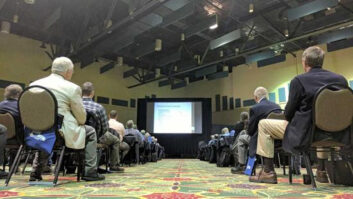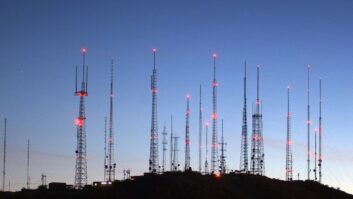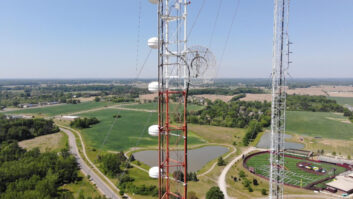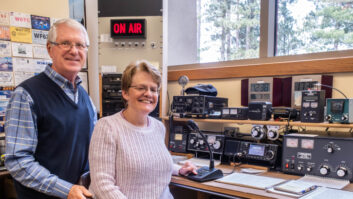WASHINGTON — Radio broadcasters continue to unlock the value in their towers by selling off the valuable assets and generating large amounts of cash.

credit: iStockphoto/fatido Industry experts say selling wireless infrastructure is a way for broadcasters to monetize holdings and to give them additional cash to invest in new technologies, or perhaps in some cases, keep lenders at bay.
Meanwhile, high demand for tower space from wireless, broadband and data providers continues to drive up the prices of towers. Broadcast towers are selling at multiples of cash flow 12 to 16 times, said media brokers familiar with such deals, and upwards of 20 times cash flow for towers with cell sites. Those rates have climbed in the past few years.
Those same brokers report that the overall market for radio stations remains soft, with perhaps multiples of five to seven times cash flow at best.
STABLE MODEL
Observers say towers can provide revenue and profit growth within a stable business model so long as wireless network providers continue to invest in their infrastructure.
Those familiar with the tower marketplace say in most cases broadcasters sell their towers and then maintain occupancy through favorable long-term leaseback terms programs. One tower industry veteran said, “It’s easy for broadcasters to negotiate favorable lease terms as part of the original sale.”
For instance, in 2015, iHeartMedia closed on a $370 million deal to sell hundreds of radio tower properties to Vertical Bridge. In a press release, iHeart said the sale was structured as a sale-leaseback transaction and didn’t affect operations of its radio stations. When the agreement was announced late in 2014, iHeartMedia President/CFO Richard Bressler said the transaction would allow the broadcaster to “optimize our balance sheet and maximize liquidity.”
Vertical Bridge is a privately held tower consolidator headquartered in Boca Raton, Fla., that has been aggressive in its pursuit of broadcast tower assets. It was founded in 2014 by executives with Global Tower partners.
Later last year, Townsquare Media announced the sale of 43 towers and property for approximately $22.8 million, also to Vertical Bridge. The sale included a 35-year leaseback agreement. Townsquare said it retains ownership of more than 250 towers.
Townsquare Chairman and CEO Steven Price said at the time, “We are very excited to complete this transaction, which will allow us to unlock capital sequestered in non-strategic tower assets at an attractive valuation level.”
This year, Vertical Bridge acquired another 200 or so radio broadcast towers from Alpha Media, including some that had been owned by Digity when Alpha acquired it. Vertical Bridge CEO Alex Gellman said then, “It would be challenging to site these towers today … Since these towers have not yet been marketed to wireless carriers, they offer attractive new collocation opportunities. Our broadcast partners will also benefit from the height of these towers as they will provide good relocation options relative to the 600 MHz auction repacking process.”
Media broker Michael J. Bergner was quoted recently by Above Ground Level magazine as saying, “If you’re a broadcaster and you’ve got a tower to sell, the bell is ringing now.” In his view, some stations have not maximized their tower assets from an income standpoint, while tower companies may be better equipped to do the job through marketing and adding tenants. He told the magazine the most active buyers have been Vertical Bridge, CTI Towers, SBA Communications and American Tower.
Other broadcasters, including Cox Media Group and Beasley Broadcast Group, have recently sold off some tower assets. Beasley sold a tower in Augusta, Ga., for $1.3 million in December, according to the broadcaster’s 10K U.S. Securities Exchange Commission filing.
Dave Siegler, VP of technical operations for Cox Media Group, said Cox sold all but one of its towers in 2015 to InSite Wireless Group, a tower operator that owns more than 1,200 wireless communications tower sites.
“Selling the sites did generate some cash, but it also allowed us to now focus on our content. We believe it’s really the most important part of being a broadcaster,” Siegler said. “The distribution of that content and dealing with the hardware is no longer our focus.”
Siegler said Cox, which signed a leaseback agreement with InSite, doesn’t see any downside to selling its towers. “We will look to maintain a good relationship with InSite and be aware of maintenance issues to make sure the sites are being cared for,” Siegler said.
Cox Enterprises, the parent company of Cox Media, has an ownership interest in InSite Wireless Group, Siegler said.
Several groups contacted byRadio World, including Emmis Communications and Cumulus Media, declined to discuss their long-term broadcast tower plans, but industry observers believe many others are exploring sale options.
Cumulus is selling off two AM sites with large amounts of acreage in exchange for a cash infusion.
The process of selling its KABC(AM) tower property in Los Angeles has not been completed as quickly as the company originally had estimated but could fetch an estimated $125 million. Selling off its 75-acre tower site for WMAL(AM) in Washington, D.C., is expected to net the broadcaster another $75 million. Cumulus likely will close those two sales in the next 12 months, according to the company’s first quarter financial report filed with the SEC.
VERTICAL VALUE
Some observers view the Cumulus moves as an outgrowth of its serious debt burden; yet similar land and tower deals are being pursued by broadcasters big and small.
AM sites in particular have long been considered juicy sales targets because of the land under them, which often has been surrounded by development since the AM towers were built. Observers say sales of very large parcels of AM tower properties will likely remain the exception.
The Cumulus deal “is a pretty unique situation that is not possible for most AM stations,” said Larry Patrick, managing partner of Patrick Communications, a media brokerage firm. “We do occasionally find an AM operator that has a large transmitter site and can sell of a portion of it. But, given that many people do not want to live next to a tower field, these sales only happen occasionally.”
In many cases though, it’s not the horizontal land but the vertical real estate that is valued.
Standalone broadcast towers that have long-term leases with broadband and cellular companies like Verizon and AT&T are popular with potential suitors because they provide consistent tower income, Patrick said.
“Towers are a stable, predictable and generate significant cash flow margins. And they do not require FCC approval so sales can move forward quickly,” Patrick said.
Patrick, whose firm has brokered such tower deals on behalf of broadcasters on a regular basis, said in some cases, companies like AT&T simply approach broadcasters and ask to buy the tower they are leasing.
“In one case, a client had a tower with two 100 kW FMs on it and an AT&T cellular antenna structure. AT&T offered to create a long-term lease for each FM station at only $500 a month total, thus providing an incentive for a future buyer to step into a below-market rate, while paying our client $1.5 million for a 500-foot tower,” Patrick said.
He also knows of a former broadcast company that sold its stations but retained about 30 towers in a number of mid-sized markets. “They are generating huge profits and have very little concerns with operating.”
The demand for vertical real estate — driven by cellular and wireless data communications — happens to coincide with a need for many radio broadcasters to generate cash to help pay down debt, observers said.
Doug Ferber, CEO of DEFcom Advisors, a Dallas-based media broker, said some in the radio industry may be struggling financially but wireless infrastructure management is profitable.
Broadcasters “selling non-core assets in some cases, especially to service debt, can be the first sign of the apocalypse. So, generally, radio companies selling their towers can be a sign of financial struggles but not operational struggles. Individual towers are producing substantial amounts of cash flow,” Ferber said.
But of course not every tower is a huge money-maker, Ferber said, because as in most real estate transactions, location is everything.
“A lot of radio towers are not suited for telecom tenants either because of location, for example on top of a mountain, or capacity limits. Therefore these types of broadcast towers will not attract the sensational prices that a telecom designed tower near a busy roadway would,” he said.
Comment on this or any story. Email[email protected].












